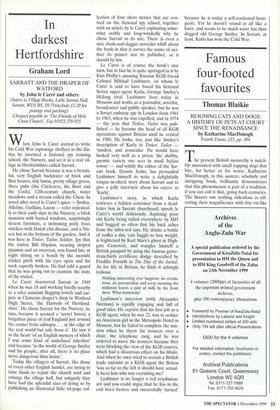In darkest Hertfordshire
Graham Lord SARRATT AND THE DRAPER OF WATFORD by John le Card and others Orders to Village Books, Little Sarratt Hall, Sanwa, WD3 BS, 0.75 (include £1.20 for postage and packing). Cheques payable to The Friends of Holy Cross Church'. Fax 01923 270 935 When John le Carrd started to write his Cold War espionage thrillers in the Six- ties he invented a fictional spy training school, the Nursery, and set it in a real vil- lage in Hertfordshire called Sarratt.
He chose Sarratt because it was a beauti- ful, very English backwater of brick and flint houses, tidy lawns, pretty village green, three pubs (the Cricketers, the Boot and the Cock), 12th-century church, water meadows and a stream called the Chess. In novel after novel le Carrel's spies — Smiley, Alleline, Guillam, Lacon — refer repeated- ly to their early days in the Nursery, a brick mansion with barred windows, surprisingly decent furniture, a swimming pool, trees stricken with Dutch elm disease, and a Nis- sen but at the bottom of the garden. And it was here in Tinker, Tailor, Soldier, Spy that the traitor Bill Haydon, wearing striped pyjamas and an overcoat, was found late at night sitting on a bench by the moonlit cricket pitch with his eyes open and his neck expertly broken. He had told a guard that he-was going out to examine the state of the wicket.
Le Carre discovered Sarratt in 1949 when he was 18 and working briefly nearby as a sales assistant flogging towels and car- pets in Clements draper's shop in Watford High Street, 'the Harrods of Hertford- shire'. He chose Sarratt for the Nursery, he says, because it seemed a 'secret haven, a forgotten piece of real England just around the corner from subtopia ... at the edge of the real world but safe from it'. He saw it as the heart 'of an English mystery of which I was some kind of undefined inheritor' and because 'in the world of George Smiley and his people, after all, there is no place more dangerous than home'.
Today the villagers of Sarratt, like those of every other English hamlet, are trying to raise funds to repair the church roof and enlarge the village hall, but uniquely they have had the splendid idea of doing so by publishing an illustrated little 64-page col-
lection of four short stories that are cen- tred on the fictional spy school, together with an article by le Cane explaining some- what archly and long-windedly why he chose Sarratt as its site. There is even a nice cloak-and-dagger samizdat whiff about the book in that it carries the name of nei- ther its printer nor its publisher, as it should by law.
Le Carrel is of course the book's star turn, but in fact he is quite upstaged in it by Kim Philby's amusing Russian KGB friend Colonel Mikhail Lyubimov, on whom le Cerro is said to have based his fictional Soviet super-agent Karla, George Smiley's lifelong rival. Lyubimov lives today in Moscow and works as a journalist, novelist, broadcaster and public speaker, but he was a Soviet embassy spy in London from 1961 to 1965, when he was expelled, and in 1974 — the year that Tinker, Tailor was pub- lished — he became the head of all KGB operations against Britain until he retired in 1980. He looks, too, just like Smiley's description of Karla in Tinker, Tailor 'modest, and avuncular. He would have looked very well as a priest: the shabby, gnomic variety one sees in small Italian towns' — and wittily the editor of the Sar- ratt book, Dennis Jenks, has persuaded Lyubimov himself to write a delightfully tongue-in-cheek story about Sarratt and to give a jolly interview about his career as 'Karla'.
Lyubimov's story, in which Karla retrieves a hidden container from a dead- letter box in Sarratt churchyard, spoofs le Carrel's world deliciously, depicting poor old Karla being tailed everywhere by MI5 and bugged so often that his back aches from the infra-red rays. He drjnks a bottle of vodka a day, eats haggis to lose weight, is frightened by Karl Marx's ghost in High- gate Cemetery, and wangles himself a British passport by using the famous grave- stone/birth certificate dodge described by Freddie Forsyth in The Day of the Jackal. As for life in Britain, he finds it achingly tedious:
Nothing interesting ever happens; no revolu- tions, no perestroikas and every morning the milkman leaves a pint of milk by the front door. What monotony!
Lyubimov's interview (with Alexander Norman) is equally engaging and full of good tales. He reports that his first job as a KGB agent, when he was 22, was to seduce an American girl in the Metropole Hotel in Moscow, but he failed to complete the mis- sion when he threw his trousers over a chair, the telephone rang, and he was ordered to move the trousers because they were blocking the view of the KGB camera, which had a disastrous effect on his libido. And when he once tried to recruit a British trade unionist as a KGB agent the Briton 'was no far to the left it should have actual- ly been him who was recruiting me!'
Lyubimov is no longer a red rev,olution- ary and you could argue that he has in the end been beaten and successfully 'turned' because he is today a self-confessed bour- geois. Yet he doesn't sound at all like a loser, and seems to be much more fun than dogged old George Smiley. In Sarratt, at least, Karla has won the Cold War.


















































































 Previous page
Previous page